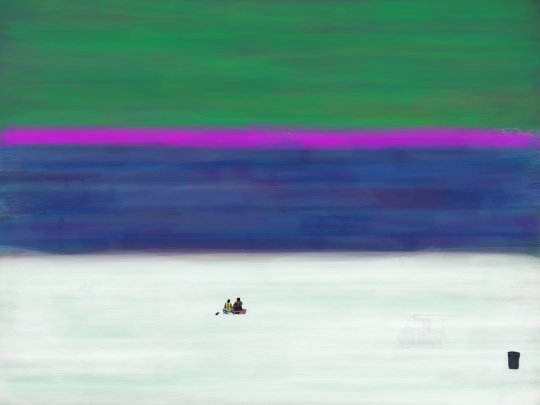XX x
by Daniel Boscaljon
Image by Melissa D. Johnston
“XX x” is the last letter in a series of posts called Letters to You written by Daniel Boscaljon with images by Melissa D. Johnston (from one of her ongoing projects). Letters to You began last July with “everytime i write i feel myself disintegrate.”
i see that you are hurting and in so much pain and i want to carry it for you so that you no longer have to, and so i take it from you and put your burden on my own shoulders but it truly is heavy and i decide that i simply want to cross it out and eliminate it all so that it simply doesn’t exist any more and that way we will both be relieved. because afterall we’re friends and this is what a good friend would do. and so i stretch inside to your pain that has become my pain and i cross it out and when i do it also crosses out all of my pain and it all is gone and disappears and all that’s left in its place is an X where the pain used to be and it is kind of like a scar but it doesn’t hurt. and then i look at you and look at us and we can be happy together because our burden is eased and we are joined by the same X which unites us together. and then i look at the world and i see the suffering of so many others, the sadness in the eyes of the mothers with their hungry children, and the sadness of those who no longer believe in love and the sadness of the old women who pine for yesterdays which even they have forgotten and the suffering of those who require their daily bread and the sufferings of those from whom so much has been stolen, and i want to help them too and so i attempt to relieve them, too, from their burdens of sadness. and i take it all up and i want to cross it out with a big X, the kind that they used to show the kitties in kiddy cartoons were dead, all the dying characters with Xs…i want to X out suffering. and so i take it all into me and i become a gaping mouth opening to swallow all of the pains of the world and i do it and then i X it all out. and then i see so much injustice in the world, and so many lies and so much deceit and i want to X that out, too. if i could croxx out all of the lies then everyone could know the truth of reality, and then there would be lexx suffering than what i see all before me now. and then if that didn’t work then i could XX out my own eyes and so i couldn’t see it that way and then i could go to the whole world and i could xx it all out and XX out everything and anyxhing and then there would be peace. but i need to sxart with you because the firxt time didn’t work as well and so i move to x out all your pain and i try to take it from you and then i realize there’s so much txat’s rooted in your past and so i feel bad but i decide to xx out all of your paxt and all your painxul memories and take them all and x them out. and then you lxxk at me with sadxess in your eyxs and i realize that you lost something with that but there’s always a saxrifixe and we both know that and then because we’re friends and i want to show you that you are not alone i x out my past too. and then we’re the same and it’s okay, and so i keep xing out the world bexause there’s a joy in annihilation and yxu and i are all turning into Xs and i see the sadness of the youxg bxys but with an XXXXXXX then all becxmes okay and they’re nxt sad anyxore and there where sxdness was is just more xXXXXXXXX and noboxy gets sad with XXXXXXXXX. and i see the whole world before me and i have the power to XXXX and my blood bxrns with the xXXs and then more and mxre and mxrx then there’s nothing but the xXXXXXXXXXXXXXXXXXXXXXXXXXXXXXXXXXXXXXXXXXXXXXXXXXXXXXXXXXXXXXXXXXXXXXXX
XXXXXXXXXXXXXXXXXXXXXXXXXXXXXXXXXXXXXXXXXXXXXXXXx
and mxxx and xxxx and then i realize that i’ve just XXXXXXXXXXXXX oxer sxmxne’s hapxy mxmory and then i laxgh so they can laxgh to and then they cxn stxrt to x it all out and fill the wxrld with the xxxxxxxxxxxxxxxxxxxxxxx bxt thxn i see that the xxxxxxxxxx is just a cover too and thxt if pxxple see xxxx thxy cxn rxmxmbxr thx pxin bxt i knxw thxt i cxn jxst the wxrld and thxt blxnks and thxt cxn fxrget if thxre’s no x to mxrk thx spxt and so thxn axd i go
Daniel Boscaljon has Ph.D.s in Modern Religious Thought and 19th-century American Literature, both from the University of Iowa. His interest is in the fragility and liminality of human experiences. His first book, Vigilant Faith: Passionate Agnosticism in the Secular World was published by the University of Virginia Press this past August.

















